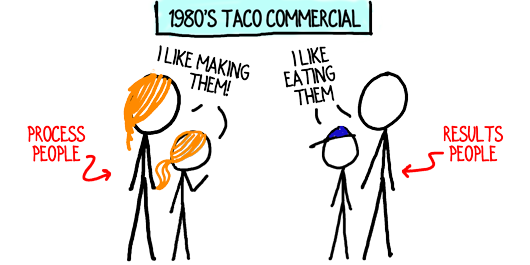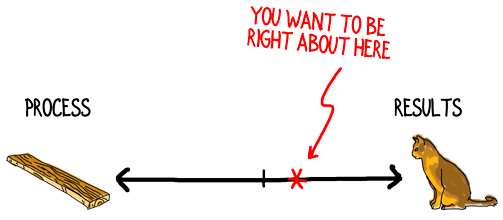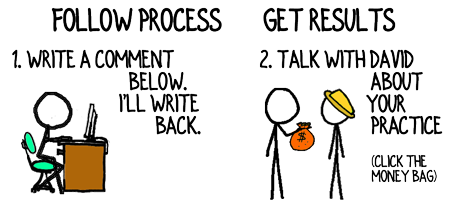Consultants tend to sell (and believe in) rigorous processes. However, successful entrepreneurs are known to eschew process and doggedly chase results. Uh oh, what does that mean for us independent consultants? Especially when it comes to business development, should we be devoted to the process or the results?
There’s a natural tension between process and results. Especially when there’s a lag between effort (e.g., cultivating the tree) and reward (e.g., eating its fruit).

Executives developing compensation plans constantly wrestle with this issue. Should they reward employees for doing the right things, or only for achieving the desired results?
Your challenge is a bit more fundamental: to grow your consulting firm, should you diligently follow best-practice processes and activities, or should you scrap the process and do “whatever it takes” to close new clients and projects?
Extremely process-oriented people are rigid, like BOARDS. They stick to their approach no matter how tempting the winds of opportunity are gusting. They explain they are “being disciplined.”
Extremely results-oriented people are reactionary, like KITTENS chasing laser pointers. They flit from tactic to tactic, always chasing the opportunity that appears closest. They note they are “seizing the day.”
The downside of being a Board is you let projects slip by if you won’t adjust your process to meet the exigencies of a specific opportunity.
The downside to being a Kitten is you never even see opportunities if you bail on a tactic just before it starts to pay off. Plus it’s difficult for Kittens to scale their firms or create efficient projects.
Obviously, you need to find a middle ground. But where, precisely? How do you know when to stick with your activities or abandon them?
For instance, if you’re giving speeches about baking cookies, and those speeches aren’t generating clients, at what point do you abandon the topic or public speaking altogether?
The answer for independent consultants like you and me is to lean toward an action/results orientation without becoming Kittens.

I offer two tidbits of advice to all the consultants I work with:
Learn and practice the principles that will grow your firm. But never let those principles get in the way of business.
To succeed in this business you need to trust in the process, while relentlessly pursuing results.
Practically, that means sticking with your approach and process, while being willing to change when positive evidence suggests you should. A lack of something happening (e.g., negative evidence) is, in the short term, not a reason to change.
Let’s go back to your speeches about baking. If your audiences respond positively, but the first few speeches fail to produce any clients, don’t suddenly switch your topic to sautéing then, when that doesn’t work, to soufflé mastery in subsequent speaking gigs.
You have a lack of evidence, or negative evidence. Stick with your original speech for a year’s worth of speaking gigs and see what happens.
However, if a dozen attendees at the baking speech each tell you afterwards that they’re dying for information on sous vide, then give that a shot your next time on stage. That’s specific, positive evidence guiding your change in direction.
Say a new prospect tells you he’ll sign a proposal if you submit it tomorrow; assuming he’s legit, that’s positive evidence that you should abandon your standard, two-step proposal process. Drop the process and close the project.
Net: be more Kitten than Board, but trust in your process and only chase the light when there’s specific, positive evidence indicating a shift in direction will pay out.
How do you balance process vs. results?
Text and images are © 2024 David A. Fields, all rights reserved.

 David A. Fields Consulting Group
David A. Fields Consulting Group 


This article is spot on. It’s contents are critical to success.
A results focus that beneficially departs from process as a signal that the process may need to change or that it should have imbedded flexibility.
Great point, Don. When you find yourself repeatedly having to bend the rules, perhaps your rules need to change. Thanks for highlighting that.
This is great and spot on.
Thanks for the affirmation, Y’vonne. Not everyone is so willing to reconsider their ways as you are!
While prospecting I often find myself wondering about the question, which I consider directly related to the topic: Where is the correct border between being blindly stubborn in my ways and being persistent? In other words, When is it time to write off a prospect?
Can you recommend any rule of thumb?
Anatoli, that’s a perfect example of the results vs. process dilemma. There are really two questions inside what you’re asking.
1) When should you change your new business process? In the short term, failure to achieve forward movement with a prospect is a lack of positive evidence. Therefore, in the short term, you shouldn’t change your process. But here’s the important part: your process should account for prospects who don’t call you back, or who miss meetings.
For example, when I conduct regular outreach, those outreaches “rot” in 7 days; if someone doesn’t call me back in that time period I throw them back in the pool for 3-6 months, at which point I reach out again.
But if your process consistently doesn’t yield clients, then you need to adjust the process. Perhaps you have the wrong steps or the wrong timing or the wrong scripts/language at each step.
2) Your second question isn’t when to change the process, it’s what the process should be in terms of persistence and follow-up. The answer to that depends on where a prospect is in the funnel and how large/complex the project is. A casual outreach is treated differently than a prospect who has received a proposal for a $500k multi-divisional project.
The further along a person is in the funnel, the shorter the interval between contacts. You rarely write off a prospect. You write off a specific project opportunity if a prospect has explicitly turned it down or if the prospect isn’t responding after 4 attempts and a “close the loop” email over the course of about 4-12 weeks.